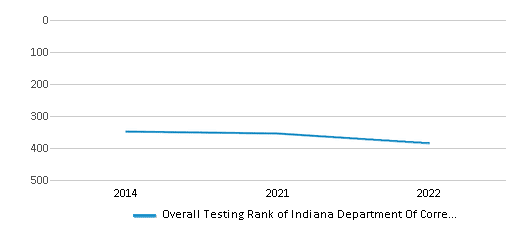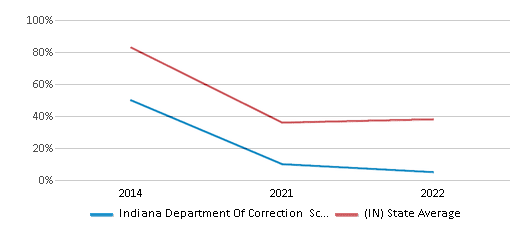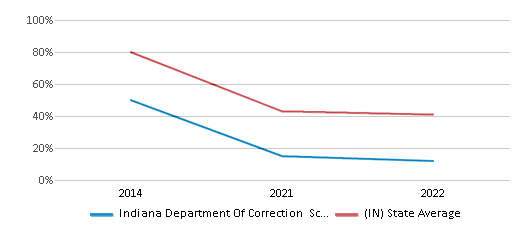Top Rankings
Indiana Department Of Correction School District ranks among the top 20% of public school district in Indiana for:
Category
Attribute
Diversity
Most diverse schools (Top 1%)
Student Attention
Lowest student:teacher ratio (Top 1%)
For the 2025 school year, there are 3 public elementary schools serving 376 students in Indiana Department Of Correction School District. This district's average elementary testing ranking is 2/10, which is in the bottom 50% of public elementary schools in Indiana.
Public Elementary Schools in Indiana Department Of Correction School District have an average math proficiency score of 23% (versus the Indiana public elementary school average of 40%), and reading proficiency score of 23% (versus the 40% statewide average).
Minority enrollment is 57% of the student body (majority Black), which is more than the Indiana public elementary school average of 37% (majority Hispanic and Black).
Overview
This School District
This State (IN)
# Schools
4 Schools
1,434 Schools
# Students
376 Students
659,177 Students
# Teachers
51 Teachers
43,939 Teachers
Student : Teacher Ratio
7:1
7:1
District Rank
Indiana Department Of Correction School District, which is ranked within the bottom 50% of all 394 school districts in Indiana (based off of combined math and reading proficiency testing data) for the 2021-2022 school year.
Overall District Rank
#385 out of 400 school districts
(Bottom 50%)
(Bottom 50%)

Math Test Scores (% Proficient)
≤5%
38%

Reading/Language Arts Test Scores (% Proficient)
10-14%
41%

Science Test Scores (% Proficient)
(20-21)<50%
38%
Students by Ethnicity:
Diversity Score
0.69
0.56
# American Indian Students
2 Students
1,027 Students
% American Indian Students
1%
n/a
# Asian Students
5 Students
19,653 Students
% Asian Students
1%
3%
# Hispanic Students
41 Students
92,967 Students
% Hispanic Students
11%
14%
# Black Students
122 Students
88,245 Students
% Black Students
32%
13%
# White Students
162 Students
418,162 Students
% White Students
43%
64%
# Hawaiian Students
n/a
755 Students
% Hawaiian Students
n/a
n/a
# Two or more races Students
44 Students
38,368 Students
% of Two or more races Students
12%
6%
Students by Grade:
# Students in PK Grade:
-
19,202
# Students in K Grade:
-
71,414
# Students in 1st Grade:
-
73,920
# Students in 2nd Grade:
-
76,347
# Students in 3rd Grade:
-
74,817
# Students in 4th Grade:
-
76,116
# Students in 5th Grade:
-
74,255
# Students in 6th Grade:
1
75,786
# Students in 7th Grade:
4
46,651
# Students in 8th Grade:
14
47,159
# Students in 9th Grade:
49
5,210
# Students in 10th Grade:
128
5,976
# Students in 11th Grade:
102
6,085
# Students in 12th Grade:
75
6,072
# Ungraded Students:
3
167
Best Indiana Department Of Correction School District Public Elementary Schools (2025)
School
(Math and Reading Proficiency)
(Math and Reading Proficiency)
Location
Grades
Students
Rank: #11.
Laporte Juvenile Correctional
(Math: <50% | Reading: <50%)
Rank:
Rank:
8/
Top 30%10
2407 N 500 W
La Porte, IN 46350
(812) 265-6154
La Porte, IN 46350
(812) 265-6154
Grades: 5-12
| 50 students
Rank: #2 - 32. - 3.
Logansport Juvenile Correctional
(Math: ≤20% | Reading: ≤20%)
Rank:
Rank:
2/
Bottom 50%10
1118 S Sr 25
Logansport, IN 46947
(574) 753-7571
Logansport, IN 46947
(574) 753-7571
Grades: 5-12
| 146 students
Rank: #2 - 32. - 3.
Pendleton Juvenile Correctional
(Math: ≤20% | Reading: ≤20%)
Rank:
Rank:
2/
Bottom 50%10
9310 S Sr 67
Noblesville, IN 46060
(765) 778-3778
Noblesville, IN 46060
(765) 778-3778
Grades: 5-12
| 180 students
Recent Articles

Year-Round Or Traditional Schedule?
Which is more appropriate for your child? A year-round attendance schedule or traditional schedule? We look at the pros and cons.

Why You Should Encourage Your Child to Join a Sports Team
Participating in team sports has a great many benefits for children, there is no doubt. In this article you will learn what those benefits are.

White Students are Now the Minority in U.S. Public Schools
Increasing birth rates among immigrant families from Asia and Central and South America, combined with lower birth rates among white families, means that for the first time in history, public school students in the United States are majority-minority. This shift in demographics poses difficulties for schools as they work to accommodate children of varying language abilities and socio-economic backgrounds.





